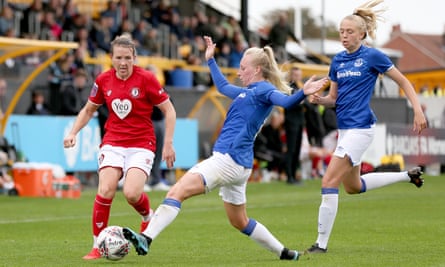Inessa Kaagman: it’s not just sport-minded at Everton, it’s personal | Women’s football
Everton’s Inessa Kaagman may be at home in the Netherlands with her family but it has not stopped the midfielder from trying to do her bit for Merseyside during the coronavirus pandemic.
The 24-year-old joined Everton in the summer of 2018 but has swiftly developed an affinity with her second professional club. So much so she is calling fans to help lift lockdown spirits.
“At my previous club we had the Ajax Foundation but that was more football-minded,” says the two-times Eredivisie winner. “We did clinics and that kind of stuff. Here I’ve done that but I’ve also been to a meeting where women can discuss their problems. That’s not just sport-minded, it’s personal-minded and I think that’s really important. Everton isn’t just a sports club, it’s a people’s club as well.”
Kaagman felt instantly welcomed at Finch Farm but was a little overawed on her first visit. “Oh my God, this is so much bigger than in Holland,” she remembers thinking as she checked it out. But a family feel and the focus on team bonding that Willie Kirk brought when he replaced Andy Spence as manager a few months after her arrival quickly bonded Kaagman to the club.
“I will always be grateful to Andy for bringing me to Everton, he made me feel at home,” she says. “When Willie came in he worked on us being a team and fighting for each other.”
Doing something for the club and fans who have helped her slot in so seamlessly felt natural. “I’m really proud that we’re doing the calls because I think it’s really important to keep in contact with fans, with the people who are always giving to the club.
“Being part of that is really important to me. The [lockdown] rules are stricter in England, so I think a lot of people find it really difficult. Sometimes one phone call from us can make their day so much better.”
The Netherlands midfielder has a degree in medicine and although fully committed to being a professional footballer has felt the pull of the crisis.
“When you look into my heart you will see I really want to help people out but I don’t think it’s possible now. I have finished my bachelor’s, so I still have to do my internships and my master’s. There is still a long way to go. But still, when you have an affinity with medicine you want to be involved.”
Instead she is re-adapting to a small bedroom and sharing space with her parents and brother in Bovenkarspel, balancing Everton’s training schedule with the Mario Kart video game, Netflix, reading thrillers and the team’s Friday night quiz.
Luckily, with her parents having played football, her father in the second tier with Telstar, and her elder brother Brian also playing, she has training partners aplenty, “a good home gym” and “we have, like, 15 footballs in the house, so I’m always near a ball”.

The difficult part is when Everton put the team on a de-load week as part of managing their activities. “I’m quite an active person, I want to do stuff, so for me it’s harder to do less than to do more,” she adds.
“Usually the whole day is filled for us. We don’t have to think about anything. We go to the club, we have breakfast, we have a meeting, we train, we have lunch, we train, we go home, and then at home we only have to eat and sleep. That’s it. Now we have to really think about what we’re doing. That’s hard for a lot of people.”
She has been able to reflect on last summer and a World Cup silver medal in her first major senior international tournament. “That was amazing,” she says. “Even though I didn’t play I felt like I deserved the medal. The staff made us feel like part of the team from day one. It’s not the 11 players or the 14 players who’ve played that win the silver medal, it is everyone.”
It has obviously fuelled a desire for game-time. “At first you’re in the squad and then you’re in the stands for the game. Then one time you go from the stand to the bench and you’re like: ‘Oh my God.’ But if you’re on the bench game after game you want to play. And then when you’re playing you’re desperate to start. So there’s constantly hunger.”
A regular starting place would be a “dream” and would provide the chance to line up alongside a number of players she captained to the Under-19 Euro win in 2014, such as Arsenal’s Vivianne Miedema and Jill Roord, who have established themselves in Sarina Wiegman’s national team, with Miedema now the Netherlands’ top scorer.
“It’s the best feeling to play for your country and to be a regular starter,” Kaagman says. I want to achieve that as soon as possible.”



